|
|
|
Sort Order |
|
|
|
Items / Page
|
|
|
|
|
|
|
| Srl | Item |
| 1 |
ID:
156100
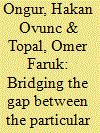

|
|
|
|
|
| Summary/Abstract |
This paper investigates whether the Turkish intellectual Cemil Meriç’s metaphor of silent yet peaceful communication among world literature classics on the same bookshelf might be employed in international political theory in contrast to traditional cosmopolitan or communitarian approaches, which favor either the particular or the universal in constructing social actors. Reviewing Meriç’s works and his conceptualizations of umran and irfan, we first inspect the underlying separation between what Meriç calls the processes of nationalism and nationalization. Meriç defines the latter as a form of people’s construction, which curiously echoes Ernesto Laclau’s definition of social articulations among conflicting particularities under a universal signifier. We then attempt to extend Meriç’s approach toward the international in order to transcend the Westphalian tradition in international relations and to reinterpret Andrew Linklater’s normative cosmopolitanism by lifting the prerequisite of dialogue among international actors for peaceful coexistence.
|
|
|
|
|
|
|
|
|
|
|
|
|
|
|
|
| 2 |
ID:
086143
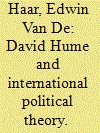

|
|
|
|
|
| Publication |
2008.
|
| Summary/Abstract |
David Hume's ideas on international relations are different than most international relations academics suppose. Close scrutiny of Hume's views on the nation, international society, war, balance of power, empire and trade reveals the need to reassess his place within international political theory. Taking an English School perspective, the analysis also shows the possible benefits for IR theorists within this tradition to focus on Scottish Enlightenment philosophy, which will also strengthen the position of the pluralist perspective within international society.
|
|
|
|
|
|
|
|
|
|
|
|
|
|
|
|
| 3 |
ID:
155784
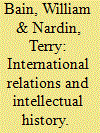

|
|
|
|
|
| Summary/Abstract |
The history of international thought has traditionally focused on a limited number of canonical texts. Such an approach now seems both naive and parochial. International Relations scholars often read their own ideas into these texts instead of getting ideas from them – ideas that if properly understood have the potential to undermine theirs. By ignoring non-canonical texts, we overlook resources that are not only necessary to establish the historical contexts of canonical writings but that can also help theorists of International Relations to understand their subject better. Judgements of what is and is not canonical are in any case themselves context-bound and contestable. Intellectual history can help us understand how the International Relations canon was constructed and for what purposes. It can also counter the abstractions of theory by reminding us not only that theories are abstractions from the activities of people living in particular times and places but also that our own theories are embedded in historicity. In these and other ways, paying attention to intellectual history expands the repertoire of ideas on which International Relations theorists can draw and against which they can measure their conclusions. The articles in this issue illustrate these points in relation to a wide range of texts and contexts. They suggest that whether one approaches international relations from the angle of description, explanation, policy or ethics, knowing how past thinkers have understood the subject can lead to better informed and more robust scholarship.
|
|
|
|
|
|
|
|
|
|
|
|
|
|
|
|
| 4 |
ID:
178692
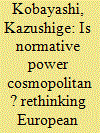

|
|
|
|
|
| Summary/Abstract |
Despite the apparent consensus that European Union (EU) normative power embodies a Kantian cosmopolitan approach to world politics, such a consensus is typically presupposed by scholars, rather than being critically examined by them. By offering macro-historical reflections, this article argues that EU normative power deviates from the Kantian cosmopolitan ideal and in fact replicates the Hobbesian logic of normative homogenization. Renouncing the medieval Vatican’s ambition to construct a united Europe anchored in uniform normativity, Kantian theory celebrates multiple normalcy as the basis for human freedom, perpetual peace, and mutual transformation. In contrast, Hobbesian theory is driven by the conviction that a peaceful value-based community could be built only through normative homogenization, behavioural conformism, and moral unity. In Hobbesian theory, the Leviathan exercises a transformative power to socialize others, eliminate discords, and build a commonwealth through norm diffusion and public education. In this vein, the EU’s aspiration to build a normatively homogenous Europe seems to reflect Hobbes’s vision of normative unity, rather than Kant’s vision of cosmopolitan diversity. Should the EU aspire to pursue a cosmopolitan foreign policy, it needs to pay more attention to the power-political implications of its drive toward normative homogenization and shift its focus from socialization to mutual transformation.
|
|
|
|
|
|
|
|
|
|
|
|
|
|
|
|
| 5 |
ID:
176499
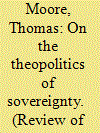

|
|
|
|
|
| Summary/Abstract |
This article considers how we can develop a reflexive reading of the theological contours of global politics through Carl Schmitt's account of sovereignty. In doing this it seeks to generate a critical architecture to understand the pluralistic registers of sovereignty within world politics. This article examines the theological dimensions of sovereignty, calling for a closer reading of the theopolitical discourses of legality and legitimacy at work within the largely secular discipline of International Relations. Tracing the pluralistic dimensions of sovereignty – juristic, popular, and theopolitical – allows us to see how sovereignty is operationalised through a range of distinct political registers. When the study of sovereignty is confused with questions of preference for modes of governing (whether secular, religious, democratic, and/or juristic) the complex historical sociology of sovereignty is overlooked. Contemporary scholarship in International Relations can benefit from closer engagement with the multiple, overlapping registers of sovereignty in global politics. We may disagree with Schmitt's reading of sovereignty as ‘theopolitics’ but there is real methodological value in engaging secular scholarship in thinking about religion as a constitutive domain for global order – alongside a rich range of critical approaches.
|
|
|
|
|
|
|
|
|
|
|
|
|
|
|
|
| 6 |
ID:
155785
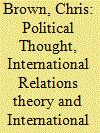

|
|
|
|
|
| Summary/Abstract |
The relationship between political theory, including the history of political thought, and International Relations theory, including the history of international thought, has been, and to some extent remains, complex and troubled. On both sides of the Atlantic, the mid-twentieth century founders of International Relations as an academic discipline drew extensively on the canon of political thought, but approached the subject in an uncritical way, while political philosophers largely disdained the international as a focus. This changed in the 1970s and 1980s, with the emergence of the ‘justice industry’ based on critiques of Rawls’ A Theory of Justice and a consequent recovering of the past history of cosmopolitan and communitarian thought. A new discourse emerged in this period – International Political Theory – bridging the gap between political thought and international relations and stimulating a far more creative and scholarly approach to the history of international thought. However, in a social science environment dominated by the methods of economics, that is, formal theory and quantification, the new discourse of International Political Theory occupies a niche rather than existing at the centre of the discipline.
|
|
|
|
|
|
|
|
|
|
|
|
|
|
|
|
| 7 |
ID:
086620
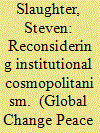

|
|
|
|
|
| Publication |
2009.
|
| Summary/Abstract |
Cosmopolitan scholarship has been at the forefront of efforts to consider political structures capable of realising justice in a more robust manner than prevailing global governance arrangements. In particular, the arguments of Thomas Pogge have contributed significantly to scholarly thinking about global poverty and his scheme of 'institutional cosmopolitanism' aspires to institutionalise human rights in the structures of global governance. This essay critiques the capacity of Pogge's cosmopolitan approach to productively guide political action in relation to global poverty by questioning whether global institutions generated by human rights are sufficient to address global poverty. The argument in this essay is that a viable guide to political action which alleviates global poverty must also take account of the potential utility of the state. This essays draws upon republican ideas to contend that cosmopolitanism needs to encompass a robust account of local institutions such as the state.
|
|
|
|
|
|
|
|
|
|
|
|
|
|
|
|
| 8 |
ID:
113297
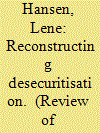

|
|
|
|
|
| Publication |
2012.
|
| Summary/Abstract |
The concept of desecuritisation - the move of an issue out of the sphere of security - has been the subject of heated international political theory debate and adopted in case studies across a range of sectors and settings. What unites the political theory and the applied literature is a concern with the normative-political potential of desecuritisation. This article documents the political status and content of desecuritisation through four readings: one which shows how desecuritisation is a Derridarian supplement to the political concept of securitisation; one which traces the understanding of the public sphere's ability to rework the friend-enemy distinction; one which emphasises the role of choice, responsibility, and decisions; and one which uncovers the significance of the historical context of Cold War détente. The last part of the article provides a reading of the varied use of desecuritisation in applied analysis and shows how these can be seen as falling into four forms of desecuritisation. Each of the latter identifies a distinct ontological position as well as a set of more specific political and normative questions.
|
|
|
|
|
|
|
|
|
|
|
|
|
|
|
|
| 9 |
ID:
138769
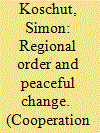

|
|
|
|
|
| Summary/Abstract |
The security community concept generally inhabits a rather small niche in the study of International Relations, as the logic of community fundamentally challenges the prevailing logic of anarchy. In this article, it is argued both on ontological and theoretical grounds that the concept’s intellectual heritage and depth transcends the boundaries of existing theories. In this sense, the concept of security community serves as a via media by linking different strands of International Relations theory together and by bridging various theoretical gaps. This argument will be developed in two steps. Firstly, it will be shown that the security community framework developed by Karl W Deutsch is deeply rooted in International Political Theory without belonging to one particular branch. By locating the concept in International Political Theory, an exercise that has been neglected by the security community literature; it will be secondly demonstrated that the concept of security community takes the middle ground between specific strands of International Relations theory, as these strands are ultimately based on concepts of moral philosophy.
|
|
|
|
|
|
|
|
|
|
|
|
|
|
|
|
| 10 |
ID:
164986
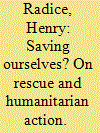

|
|
|
|
|
| Summary/Abstract |
This article contributes to the international political theory of humanitarianism by unpicking the politics of humanitarian action’s simplest expression: saving human lives in the name of humanity. Both saving lives and defining notions of common humanity are closely interrelated acts of power. What saving a life means depends on a prior definition of humanity; humanitarians’ acts of rescue are the measure of their commitment to humanity. The politics of rescue and the politics of humanity are inextricably linked. The article explores four facets of this nexus. First, it considers the meanings of rescue, from saving bodies to saving lives, linked to contingent understandings of humanity. Second, it turns to the rescuers, for whom rescue performs particular functions, not least the need to preserve a sense of self. Third, it situates their often narcissistic motives in relation to the consequences of humanitarian action. Fourth, it addresses the power imbalance inherent in rescue and the problem of causing harm. It concludes that rescue is always an act of presumption, but one that can be tempered by humanitarian actors willing to embrace their role as ‘moral politicians’ (Walzer), aware of their power and their dirty hands, and open to contrasting understandings of humanity.
|
|
|
|
|
|
|
|
|
|
|
|
|
|
|
|
| 11 |
ID:
151642
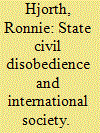

|
|
|
|
|
| Summary/Abstract |
This article examines the concept of State Civil Disobedience (SCD) in the context of international society. It is argued that SCD is problematic for several reasons. First, that SCD is extremely difficult to practice in an association such as international society, relying, as it does, a great deal on the policies and powers of a few dominating actors; second, that the unequal status of states makes SCD mainly an instrument of the strong, hence undermining not only the idea of civil disobedience as the strategy of the weak but also questioning the role of SCD within an international society based on the formal equality of states. It is concluded that the practice of SCD in international society requires an invigoration of international society as a moral association. A more practical alternative, it is argued, is to conceive of a limited concept of SCD confined largely to non-violent means and preferably practiced in order to resist legal anomalies.
|
|
|
|
|
|
|
|
|
|
|
|
|
|
|
|
|
|
|
|
|